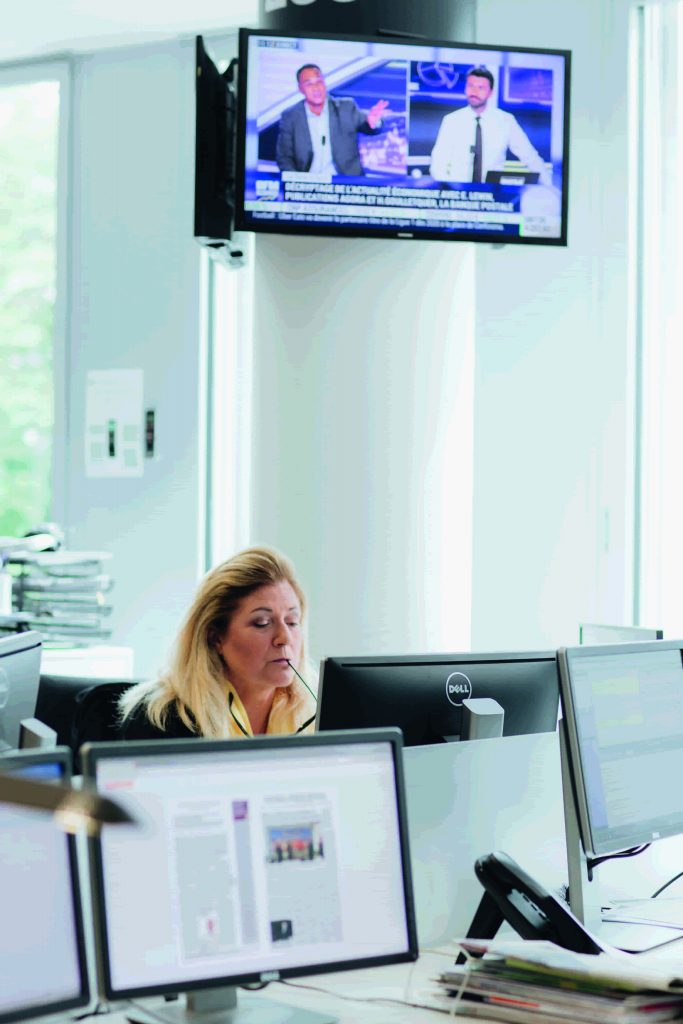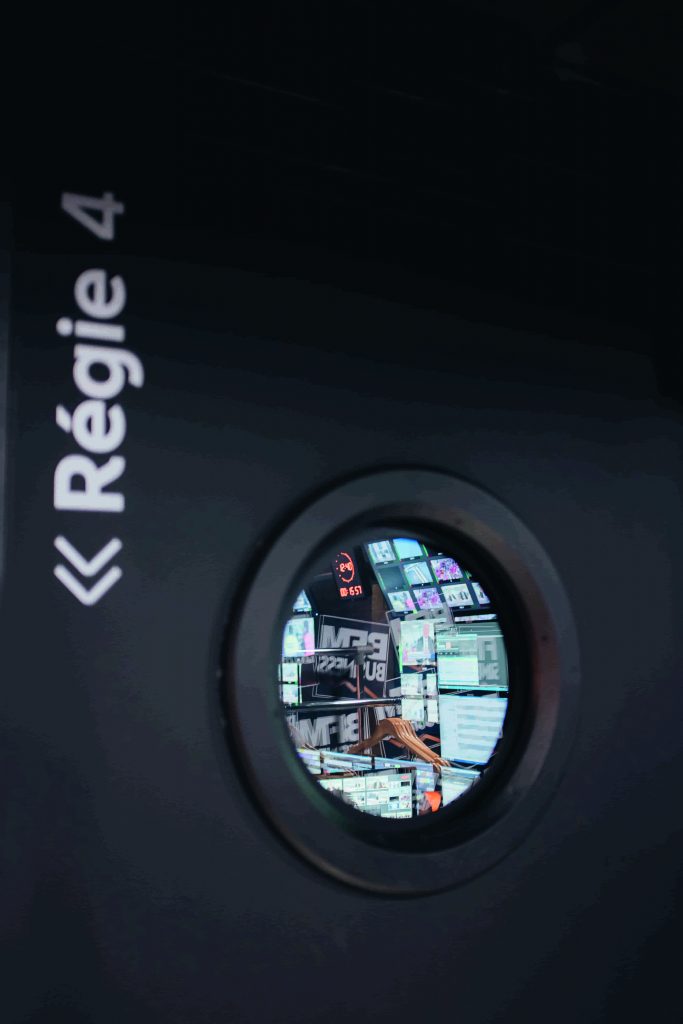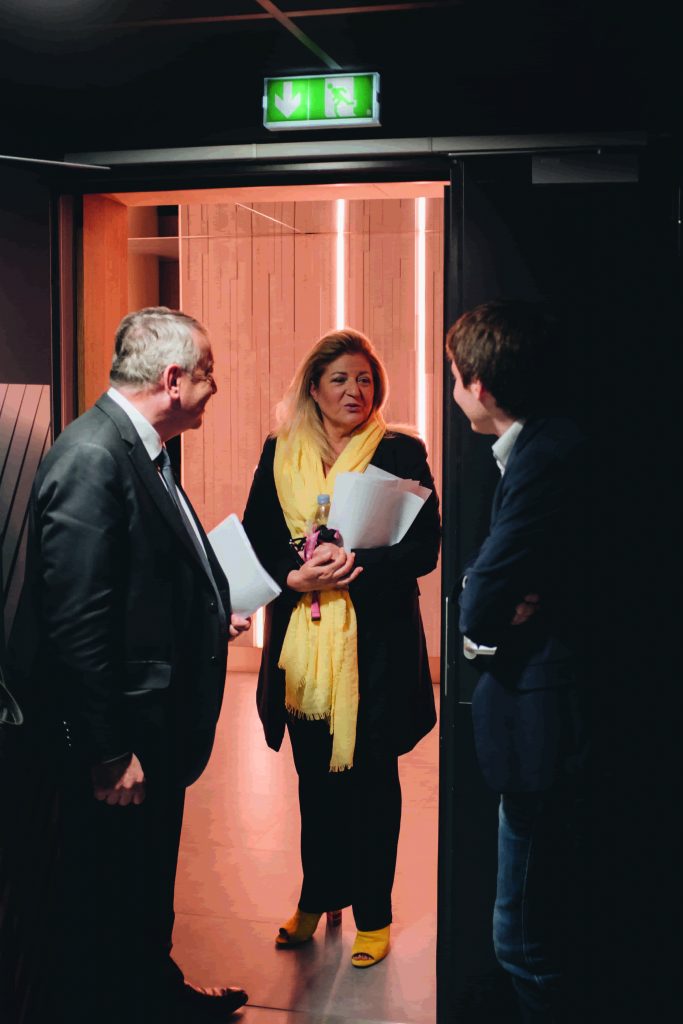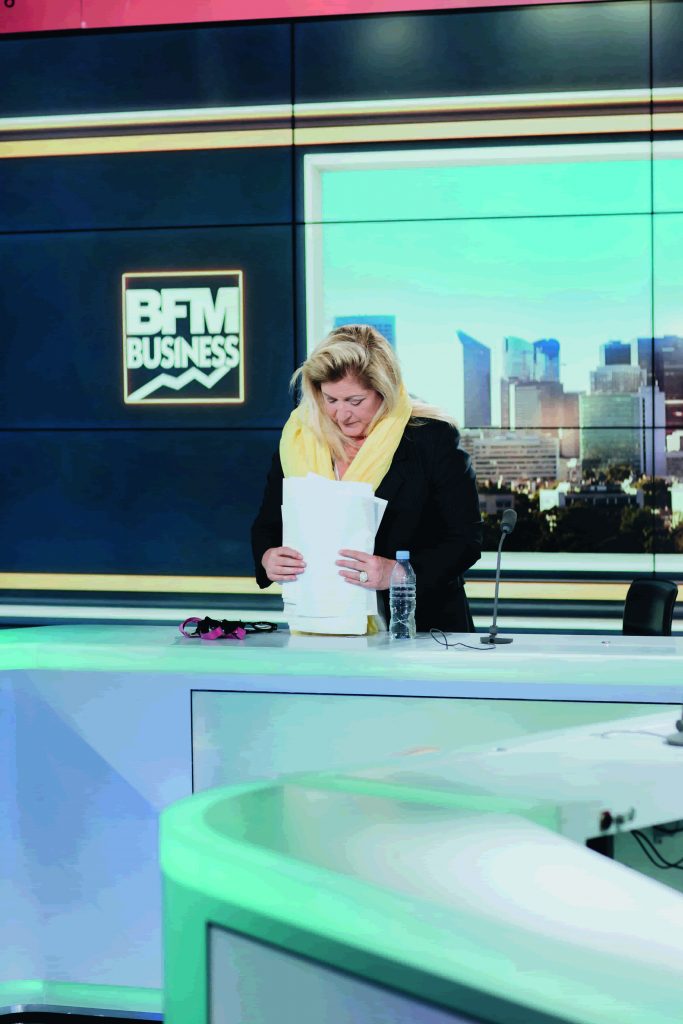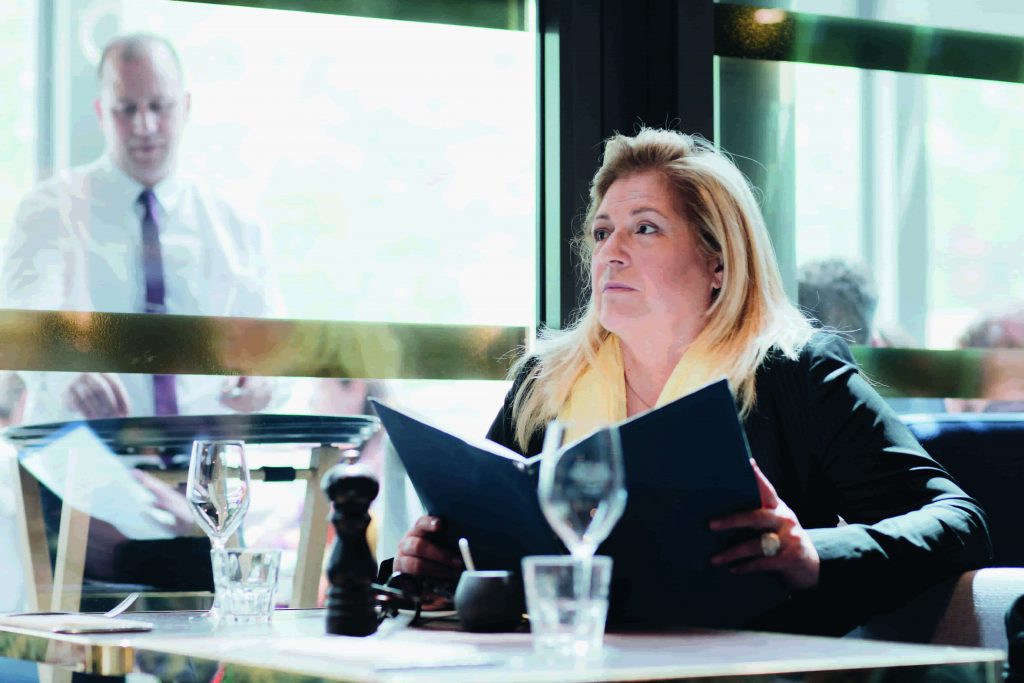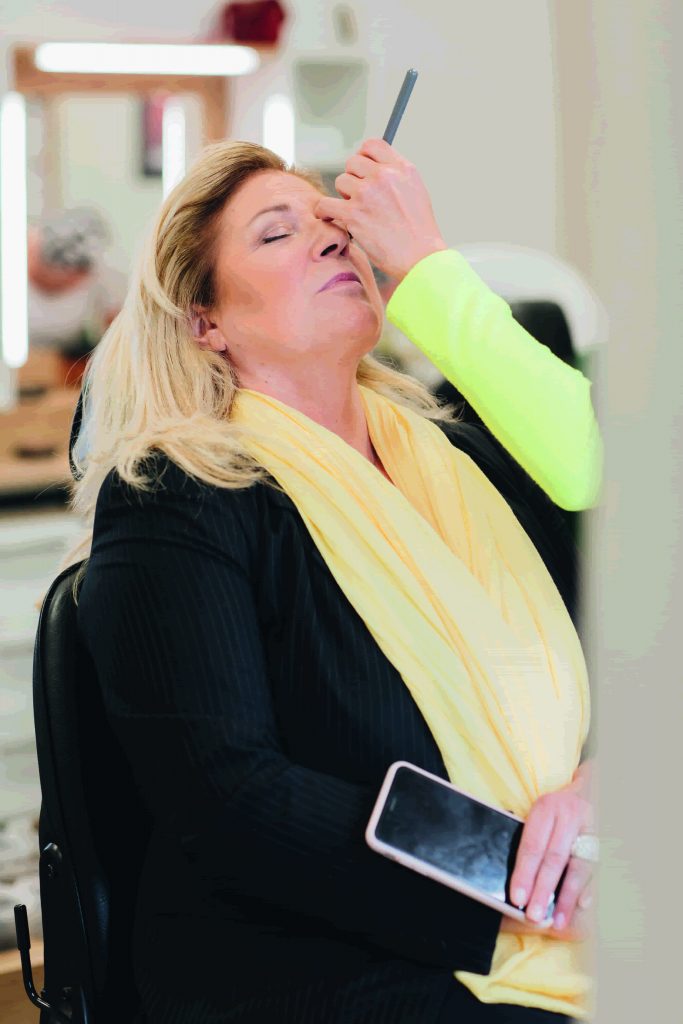Hedwige Chevrillon (MBA.84) : backstage at the cable channel BFM
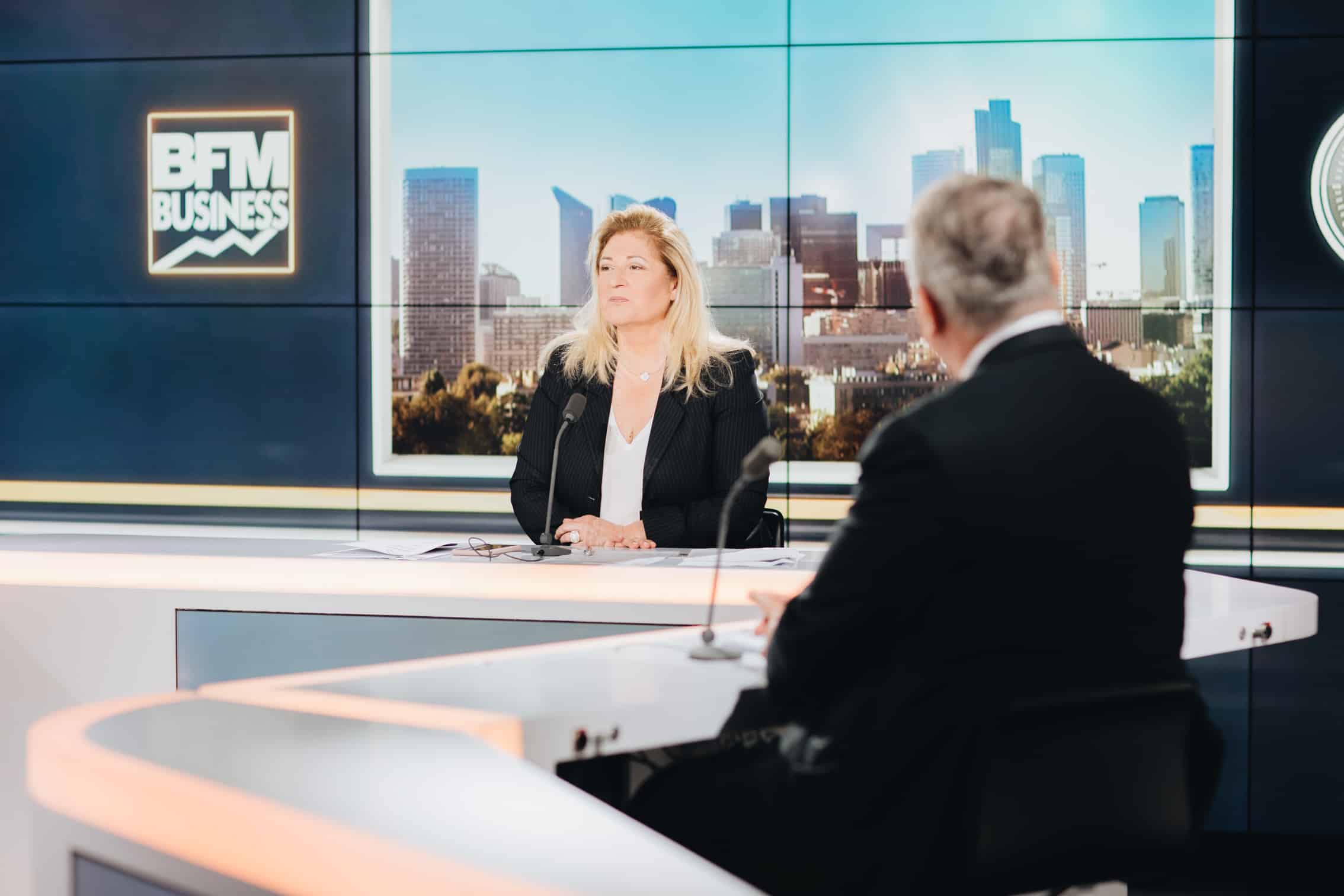
She hosts one of France’s most-watched economy-oriented talk shows, “L’Heure H” (“The H Hour”). We followed Hedwige Chevrillon (MBA.84) for a day backstage at the cable channel BFM.
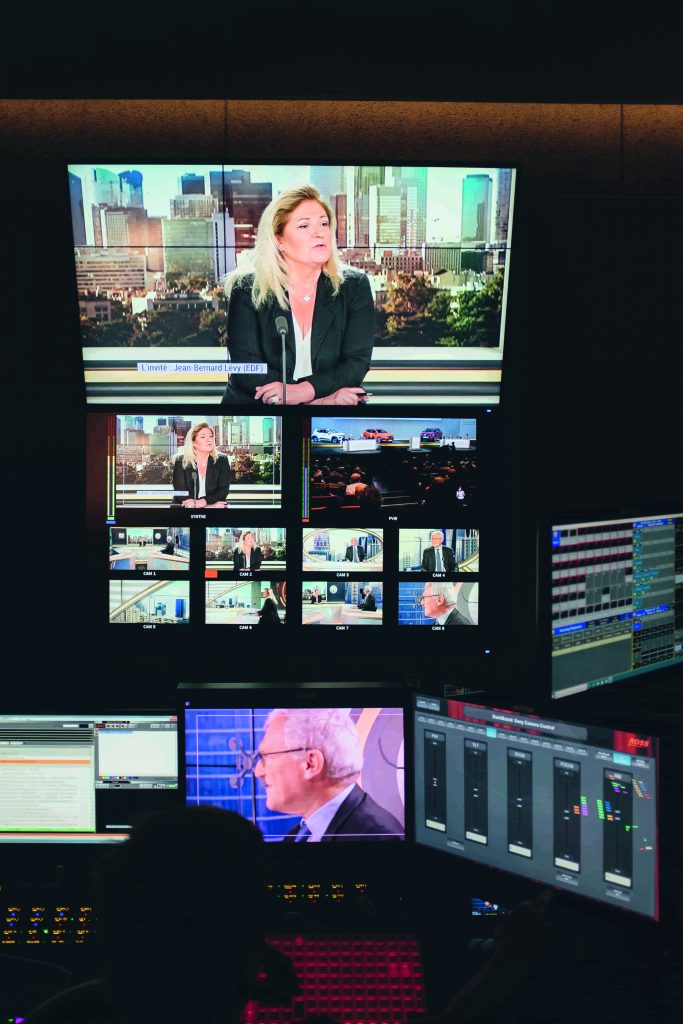
Two glass and steel monoliths face each other along General Alain de Boissieu street in Paris’s 15th district. On one side, the new 145,000m2 Ministry of Defense; on the other, the 86,000m2 Altice Campus. One of these massive grey blocks plots out the routes of tanks and refuels fighter jets. The other is a true media arsenal that can bombard viewers with programming non-stop: 130 shows per week, battalions of journalists, cutting-edge studios. In the entrance, ads for SFR and live BRM and RMC broadcasts are playing side by side on wall-sized screens. High-tech, efficient and no-frills: Welcome to the media-telecom empire of Alain Weill (MBA.84) and Patrick Drahi.
Altice Campus, 10:30 AM
“What do you think? Really cool, right?” Hedwige Chevrillon has just appeared. “We moved here eight months ago and that made a huge change. Before, we were in an aging building with a fabulous view of a parking lot and the atmosphere of a start-up… But it was definitely less well equipped.” Smiling and joking, Hedwige is the opposite of the stern image she projects on television. I follow her to the editorial offices of BFM Business by way of “studio street”, a long corridor lined with the center’s seven studios, all equipped with robotic cameras (no cameramen) and state-of-the-art control rooms. “With all this, we’ve gone way beyond ‘filmed radio’.” We pass through two security doors and take the elevator to two, the BFM floor.
BFM Business editorial department, 10:42 AM
At the Altice Campus, everything is flexible and adaptable: studio sets are virtual and editorial offices are set up in huge open spaces, as in any contemporary office building. What sets this place apart: as you walk through it, you recognize well known personalities. Stéphane Soumier says hello from the coffee machine. Nicolas Doze and Emmanuel Lechypre are busily doing things in front of Hedwige’s office.
An office like any other, except for one thing: “They wanted to get rid of all the wastebaskets, but I held on to mine. I need it too much.” Putting her words into action, she picks up a pile of newspapers on the table and tosses them into the basket. Then, turning around, she says, “Matthieu, have you got five minutes?” “Matthieu” is Matthieu Pechberty, an economics journalist from Journal du Dimanche. “He knows the energy sector inside out. Since my guests today are the heads of EDF and Veolia, I want to try out my questions on him,” Hedwige explains.
They chat quietly: –“Can I ask him right out whether he thinks Total is his main competitor?” –“Yes, it would be interesting to see how he’d answer that. Total just bought Direct Énergie, and I don’t know if he expected that. In any case, they’re a big rival.” — “As for Veolia, did you see that the CEO of Suez said he wanted to be number one?” — “You could suggest a merger…” –“Nah, I already tried to bring Saint Gobain and Engie together, and that didn’t go anywhere…” Suddenly they start whispering about texts exchanged by heads of companies.
After a last glance at her roadmap and notes, she gets ready to go downstairs. But she’s missing something. She rummages around inside her desk and takes out a bottle of perfume. “I never go to the studio without perfume; it’s part of the ritual.” Even though she’s been working in media for a long time, she seems a bit nervous. Touching up her hair in the elevator (“last chance to get it together”), she heads to makeup.
BFM Business studio, 11:45 AM
Back on studio street, Hedwige cordially greets Jean-Bernard Lévy, the president of EDF. It’s obvious that they’ve known each other for a long time: “With you, the subjects are complex but you’re a pretty easy guest…and you get better every time!” She warns him, however, “I’m certainly going to ask you a question about the significance of the government being a shareholder in the Renault-FCA affair. In any case, now that you’ve been reappointed, you can relax.” (note: Jean-Bernard Lévy’s term of office was renewed in May).
She introduces me to the EDF boss, tells him about the article, and takes the opportunity to mention her ties to HEC. “I got an MBA there and my brother graduated in 1976, with Denis Kessler, Henri de Castries, Jean-Dominique Senard…”. “As for me, at École Polytechnique, I was with Xavier Huillard, Jean Tirole, Patrick Kron…” the EDF president says. And so, two minutes before they go on the air, in the dim corridor leading to the BRM Business studio, they’re bragging about their respective alumni connections! A commercial starts and we quickly take our places in the studio while final adjustments are being made – adjustments interrupted by a surprise visit by the head of the place, Alain Weill, who has come there to greet the guest. In the process, he gets right in front of a camera and blocks its view. A technician in the control room is stressed out but doesn’t dare say anything to the big boss, who, luckily, moves aside.
Control room, 11:38 AM
While the preparations for the show were lively, spontaneous, even a bit improvisational, the mood in the control room is one of military efficiency. It feels like the cockpit of the USS Enterprise, the Star Trek spaceship. Right in front, a special-effects person and a director, each facing dozens of screens, fiddle with all kinds of colorful buttons, joysticks and dials.
Behind them, the show’s producer (always known by the English word), the commander of the spaceship, runs through the final checklist before takeoff. During the show, it’s the producer who edits and posts the “synths” (texts of a speaker’s main comments, appearing at the bottom of the screen) and the “offs” (images scrolling in the background), suggests additional questions to Hedwige through her earpieces, and even Tweets in her name!
But now, just seconds before the show is supposed to start, he realizes that something’s not right. A Total commercial is scheduled to air in the middle of the EDF president’s interview. Awkward. He rushes to the microphone to ask Hedwige, through her earpieces, what she wants to do about this. The moderator’s voice echoes throughout the control room — “Impossible!”—and a dozen screens show the blocking movement she makes with her hand in front of one of the studio cameras.
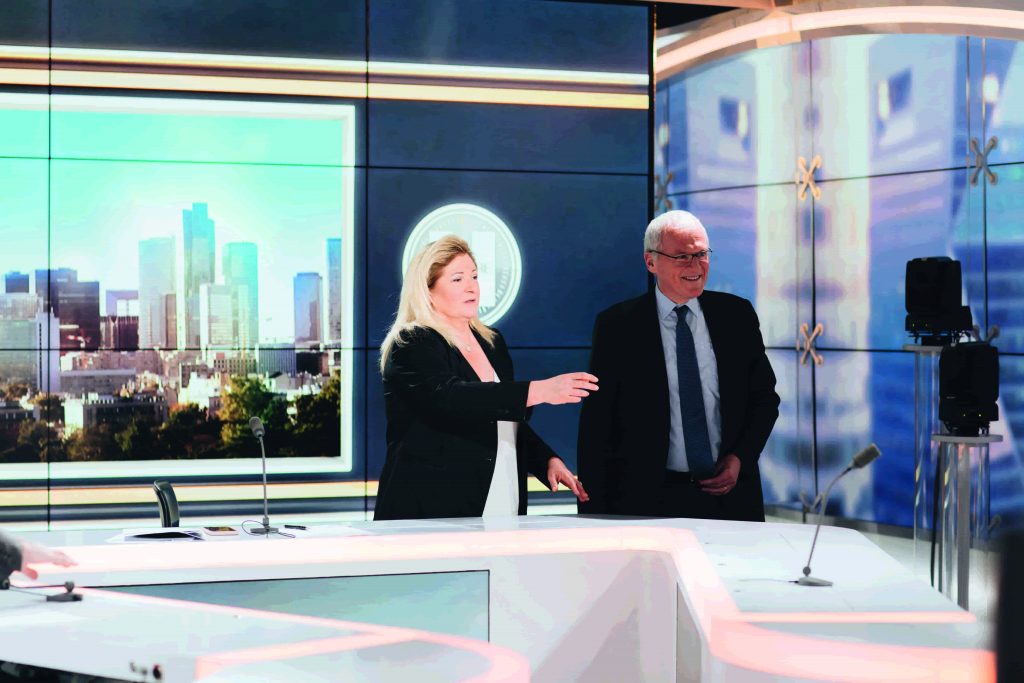
At noon on the dot, the credits start rolling and Hedwige wipes off her smile to assume the role of a hard-nosed journalist who will not let anyone off easy. Her first question sets the tone: “Jean-Bernard Lévy, you’ve been following the Renault-FCA story. Is the government a really bad shareholder? (Note: The government has an 85% share in EDF.) The interview continues in the mood typical of Hedwige’s talk shows.
All her questions are challenges, as though she’s saying “Don’t bother repeating the official line; we’ve heard all that before.” She doesn’t hesitate to interrupt someone or to ask off-the-subject questions that either trip people up or appear to lack conviction and fade away. It’s lively, it’s flawed, it’s real. As soon as the program is over, Hedwige goes back to Thomas to ask what he thought. “Fantastic! You asked great questions and it got a long ‘Urgent Reuters’.” To be covered in one or many reports by Reuters or AFP is the gauge of an interview’s success. And to get an “Urgent Reuters” is like winning Olympics gold.
Aux 3 Présidents restaurant, 1:23 PM
After the excitement of the live show, the adrenalin level drops. We walk more slowly, we speak more quietly, the atmosphere is more relaxed. “Where should I take you to lunch?”, she asks me. “We could go to the cafeteria, but that might be boring.” Finally she decides to make a reservation at “Aux 3 Présidents”, a brasserie within the Altice Campus whose name is a reminder that the chef served at the Elysée Palace during three French presidencies in a row.
His new place is just as worldly. Ruth Elkrief, the BFM TV moderator, is sitting behind us; Laurent Joffin, head of Libération, is on our left; the basketball star Tony Parker, who has come there to be interviewed, is on our right; and Christophe Barbier, head of L’Express, is sitting a bit farther away. It’s a paparazzi paradise. And a symbol of how French media is intertwined: Patrick Drahi literally seats at the same table a BFM Business star and the head of a newspaper that hurled “Get out, rich asshole!” at Bernard Arnault.
I take advantage of this lunch break to learn about some of the TV’s host’s little secrets. “My biggest enemy is what’s called ‘talking points’,” she explains. “To fight them, you have to surprise people. That’s why I sometimes ask questions that might seem off the subject, and it’s why I sometimes hesitate. It’s the art of war, like Sun Tzu says. You act uncertain, weak, and your adversary feels confident, and then bam! You hit him hard when he least expects it. It might look like I’m improvising occasionally, but really I’m extremely careful about what I’m doing, something I learned from print journalism.”
When I ask her what she most enjoys about her profession, she answers enthusiastically, “I love interviews with a really intense back-and-forth, or even those that are heavy-going, where there’s an underlying struggle to get what I want.” And what drives her crazy? “I’m fed up with guests who keep asking to see questions in advance, when I never give questions in advance, as they well know. In any case, it’s not hard to figure out: I’ll never ask Jean-Bernard Lévy questions about the Israeli-Palestinian conflict!”
Makeup room, 2:45 PM
Removing makeup is the last stage of the early-afternoon break. In the cozy room, Hedwige and the makeup artist joke about their husbands and chat about their vacation plans. It turns out that this morning, mascara had been forgotten. “Too bad for your photos,” she says. “These things count, since, on the screen, everything can be seen. If I’m a bit tired, I receive worried text messages; it never fails. And, you must never, but never, be in too much of a hurry. Once I arrived just in time: my voice was high-pitched, I was out of breath; it was horrible! I learned my lesson!”
The makeup session is also an important opportunity to fine-tune the coming interview and review her questions for the last time, without any pressure or interruptions from her cellphone. At just that moment, her phone starts to vibrate. It’s Twitter. The president of Total, Patrick Pouyanné, has posted some harsh remarks on the social-media platform about what Jean-Bernard Lévy said during Hedwige’s interview. Media outlets have noticed. For example, a headline in Capital reads,“Total and EDF bosses fight it out in public”. “We created a buzz!” she says, delighted. And that’s how the news is born.
BFM Business editorial department, 1:30 PM
“Sorry, now I have to work a little”. Work, for Hedwige, means first answering emails, which she receives non-stop. “I’ve set myself the goal of never having more than 3,000 unread emails. This means I spend a lot of time using the Ctrl+D key (note: the keyboard shortcut that deletes messages in Outlook).” Work also means finding new guests. “Next week is looking kind of skimpy, so far.”
This leads me to ask her what she does if a scheduled guest fails to show up. “We improvise,” she says. “I make calls to find a replacement as soon as possible, or we ask some of the experts here – like Emmanuel Lechypre – to come down to the studio. It’s extremely rare, but very stressful.” I ask her about her worst memory. “A technical issue.
My guest was Bill Gates, the president of Microsoft, and everyone was on edge. Then there was a problem with his earpiece! There was a constant whistling, the Larsen effect. The technicians tried everything to solve the problem, including replacing the earpiece, but nothing worked. He ended up angrily throwing the earpiece down. I had to improvise the interview in English with Bill Gates in a really bad mood. It was hell. Several technicians offered to resign. Later we discovered that it was because of Microsoft’s European director, who hadn’t turned off his cellphone when he was told to!”
Conference room, 4:00 PM
The editorial meeting is held in a room on the corner of the building, surrounded by trees. Maud Aigrain, editor-in-chief of BFM Business, sums up the key events of the week to come: raising money for a start-up whose name she doesn’t want to reveal, the government’s press conference on unemployment insurance, a meeting of the Fed (“but not yet the one where they announce that they will lower interest rates”), etc. All upcoming economy-related news is on the list, in a preview! Guests are discussed; calendars are filled in. Calendars that are, by definition, open-ended. “For Tuesday, it depends on what time Matignon chooses. We have to move forward blindly, get our pawns on the board, and then adapt to the schedule.” Organizing news broadcasts is like playing a huge game of Tetris where you discover pieces at the last minute.
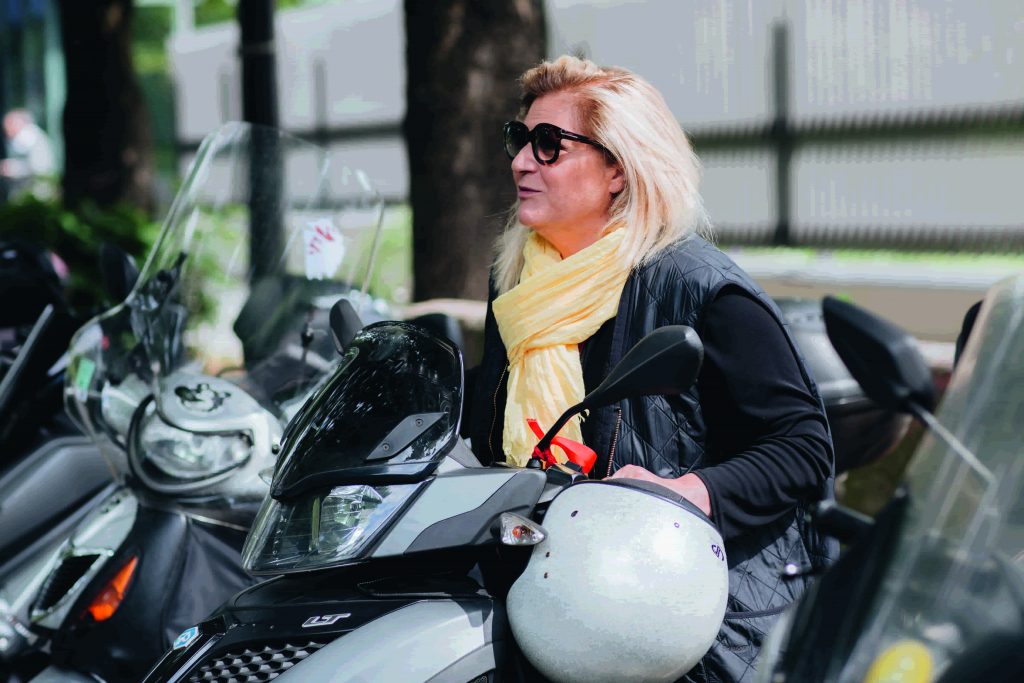
Rue René Ravaud, 5:13 PM
At the end of the day, I go with Hedwige to her scooter, recognizable thanks to its pink ribbon, the symbol of Coeur des Femmes, an association that finances research concerning women’s cardiac diseases. “It’s practical because it makes it easier to find.” She sits behind the handlebars. I ask her, indiscreetly, whom she’s going to meet. “You can just say that it’s with a future unnamed guest; that will sound mysterious. Look how nice I’m being! I’m even giving you a conclusion for your article!” she declares, before putt-putting off toward the ring road.
Published by Arthur Haimovici


